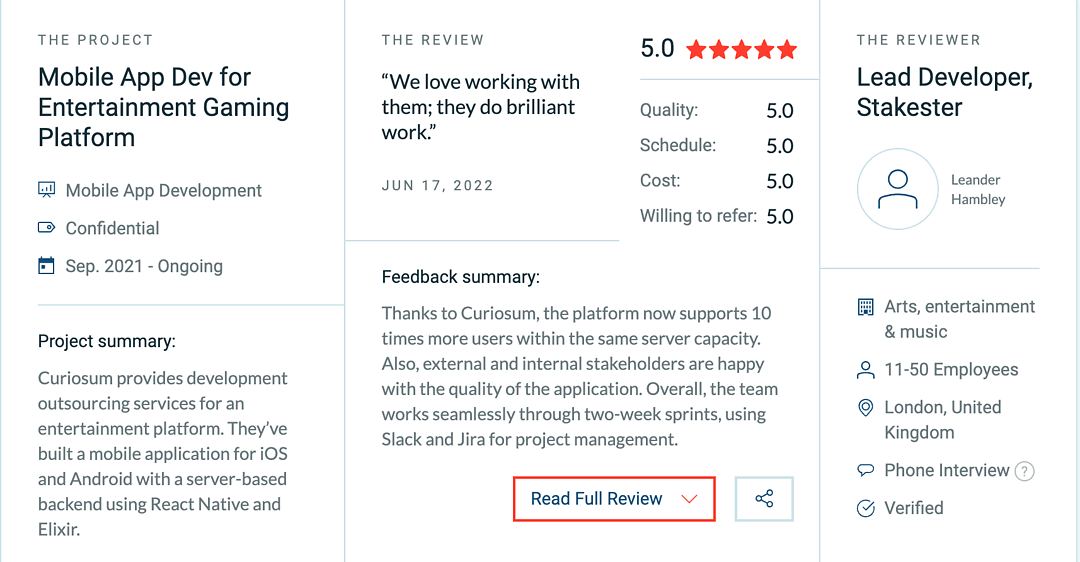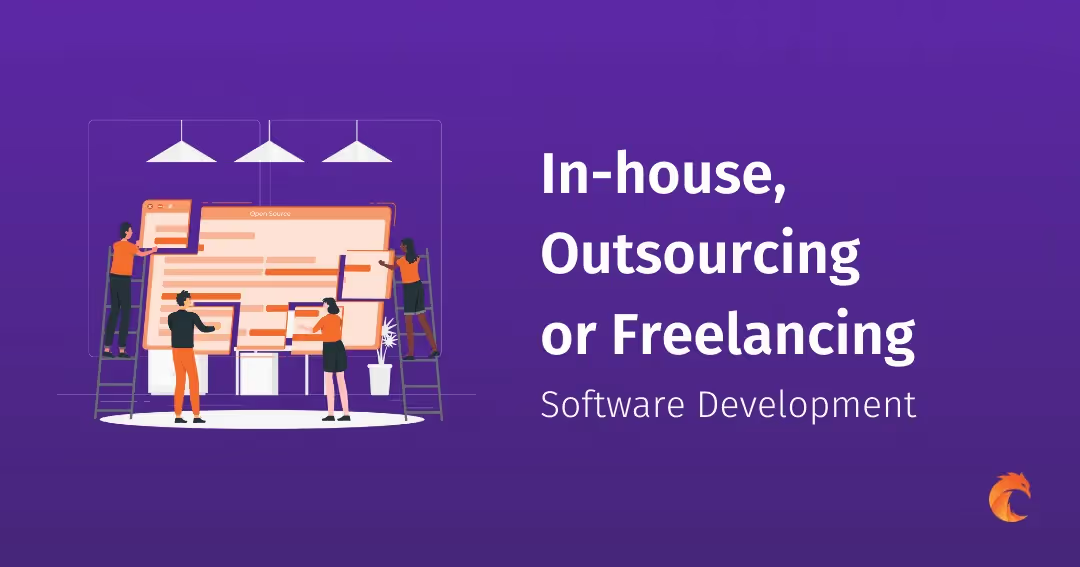Pros of development outsourcing


So, it begins. You are about to start your own IT business. You have the idea, the plan, and a great pitch for the investors, and according to your plan – in about 3 years, you will be ready to join the elite S&P 500 club.
You are determined and hungry for success. This is the moment when every successful enterprise starts.
At this point, you will probably start with a decent business plan, sales model, or gathering funds for upcoming investments. And this is a great idea! This is what the first steps should look like. However, soon you will face a new serious challenge – preparing the prototype for your app.
You should know that software development is a pretty complex process. It is a team sport that requires technical mastery, good planning, and efficient communication between players. Also, as far as we stick to the sports analogy, bear in mind that it is more like a ‘marathon’ than a ‘sprint’.
In general, there are 3 different models of software product development strategy: in-house development, outsourcing, and the hybrid model (a mix of the two initially mentioned).
In-house development
If you or your co-founder is an experienced developer this will probably be the first thing that comes to your mind. Using your skills to prepare the app prototype will help you save money in the early part of the enterprise. If you are fortunate that your CTO can work on both the back and front end of the software, you will be ready to present the early version to the investors and even attract the first customers. However, in the long run, it is impossible for one man to handle the entire development and C-level duties. Sooner or later, as the product becomes more mature, you will need additional programmers, software testers, designers, and managers within your team.
In-house development means that your company hires the whole tech team as an effect of the recruitment processes. These are your employees, and you are responsible for team management, payroll, and the final results. Currently, due to the increasing complexity of the software development processes and the necessity of using different technologies and skills, the pure in-house model seems to be slowly vanishing.
Outsourcing
Hiring a whole team of experts, especially at the early stage of your business, may be time-consuming and expensive. You have to build your own recruitment process, secure funds for upcoming months, and create a modern and safe work environment. There is a way that will allow you to avoid this spending and speed up the entire process most efficiently.
Development outsourcing means that you work with a third-party provider, and the external company is responsible for the whole project.
Companies that specialize in delivering custom software solutions are usually called software houses. Starting from prototyping through the code creation and launching of the product, they can provide you with a whole range of services.
Hybrid model
Next to the outsourcing model described above, hybrid development is probably the most popular, especially among SMBs and larger companies. The idea is to augment the internal development team to complete particular tasks. For example, your crew takes care of the core of your product, but external partners prepare additional components. That may include microservices, third parties integrations, mobile app development, etc.
In this model external team is working closely with your devs and managers to deliver high-quality code and boost your business. It is as simple as that!
Benefits of outsourcing development services
It’s efficient!
Software Houses are aggregating passionates and usually are built around a particular tech stack or industry. Working closely with that kind of company ensures that every single developer is closely examined during the recruitment process and has the knowledge and experience that allows him/her to handle different projects.
It's time-saving!
You should know that recruitment in IT is usually long and difficult. Sometimes it takes months to find a proper candidate, complete the assessment session, do a proper screening, and – of course – negotiate the salary. The next step is the onboarding process which may take weeks... the paperwork... relocation, etc.
On the other hand, right after signing the cooperation agreement with the software house, you have access to the most qualified consultants in their industry. And right away, you may begin product development. Choosing a decent company may be challenging, but here’s the hint – start your research from Clutch. It’s a reliable source of information when it comes to choosing the right partner. I guarantee – finding the entire IT department will be easier and faster than recruiting a single developer!

Here comes the most important part of this section. For you, an entrepreneur, it might probably be the most crucial part of the whole article, so I allow myself to bold it up: Outsourcing saves your most valuable resource – YOUR TIME. As a captain, you are expected to plan a ship’s course, focusing on the bigger picture, relations with investors and key managers, and interacting with the business environment. The technical job might be delegated elsewhere, but your presence and vision are definitely not.
It's about risk management
I mentioned above that recruiting your in-house team can be tricky. It takes a long time; it is expensive, and even if you believe you have found the right developers, you need to wait for them to prove their skills. In the outsourcing model, you have the whole know-how of multiple developers available at hand. Moreover, important from the point of risk management you are signing a contract with another company and now they are obliged to deliver the product according to the enclosed SOW (‘scope of work’). It means that as long as you secure the necessary budget, they have no other option than to do the work.
Another hint from my side (blink): this solution is just PERFECT for startups. How do you think which company will be considered a more attractive investment for VC partners or more secure for banks to finance?
“Company A” which is about to create an IT department in 5-6 months and meanwhile start the development? Or...
“Company B” that is planning to collaborate with a professional and reliable software house and, if financed properly will be ready to prepare the MVP and get the first customers in 5-6 months?
It's cheaper!
Here is a list of example costs that you do not have to cover when outsourcing developers as opposed to direct hire:
Equipment and Infrastructure
You do not have to bear the cost of providing equipment such as laptops, computers, software, and office space for the in-house developers.
Training and Development
Working in a software house means constant self-development. Training programs, conferences, guest blogging, and of course, hundreds of hours spent on upgrading skills. This is a necessary cost for that kind of company to handle, as they are supposed to deliver top-notch solutions for different industries. As a software house’s partner, you don’t have to worry about it.
Employee Benefits
Employers typically offer their in-house employees benefits such as health insurance, paid time off, and retirement plans. It is your partner’s duty to provide such benefits and attract the best talents to the organization.
Payroll Taxes and other Legal Obligations
Companies must comply with various legal requirements and pay taxes on behalf of their employees. These include Social Security, Medicare, unemployment insurance, and workers’ compensation. Outsourcing a developer eliminates these obligations as the outsourcing company is responsible for them.
HR and Administrative Costs
I have already mentioned the recruitment costs of hiring your own IT team. You may have to hire additional HR personnel to handle the administrative tasks of an in-house developer. These include recruiting, onboarding, performance management, and payroll processing. Still, you have to track the HR performance by constantly checking different KPIs like CPH (‘cost per hire’), TTH (‘time to hire’), candidate NPS etc. These are serious spendings that you can avoid.
Summary
There is no doubt that software development has become a very complex and difficult process. If you decide to outsource the tech part to a specialized company, you may be sure of a positive impact on your business. And you may focus on really important matters – leading your business and achieving your goals without worries about the product preparation itself.
Ready to scale your business with the right tech partner?
Related posts
Dive deeper into this topic with these related posts
You might also like
Discover more content from this category
The PropTech industry, a blend of property and technology, represents a rapidly growing sector where innovation is reshaping how you buy, sell, and manage real estate.
As the CEO of an international company or a budding start-up, you are faced with the challenges. It is a responsible decision that will affect the development of your company, but also its economic status and market position.
“Building apps” is actually an extremely wide subject. From complex, machine learning assisted solutions for tough business cases, up to simplistic planners and message boards, you get what you put in.




